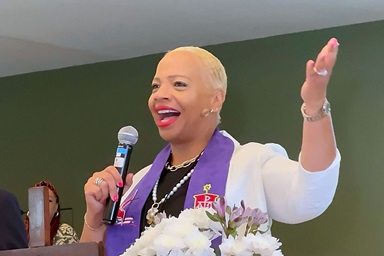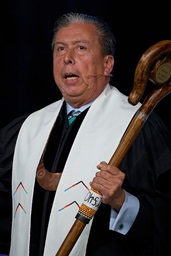Key points:
- The Rev. Glen “Chebon” Kernell, executive director of the United Methodist Native American Comprehensive Plan, shared the realities of threatened cultures.
- One objective of the Plan focuses on the ever-growing efforts for climate justice.
- Kernell attended the 11th General Assembly of the World Council of Churches, an ecumenical gathering that included around 3,000 participants from 120 countries.
In former times, the Rev. Glen Kernell would have been called an “Indian.” His name in the language of his tribe is Chebon.
As European settlement of North America expanded westward, the indigenous population with cultures going back hundreds and thousands of years was overwhelmed, oppressed and massacred. Families were split up and children re-educated.
Kernell said only 0.004% of Native Americans in North America survived after the relocation and dispossession period when Native Americans were forcibly removed from their lands and taken from their families. Today’s Native population are the descendants of those survivors.
“I’m one of them,” he added.
During the 11th General Assembly of the World Council of Churches, held Aug. 31-Sept. 8, Kernell talked with UM News about what it’s like for threatened cultures consigned to life on the sidelines. The ecumenical gathering is characterized by colorful diversity — not just in terms of culture, but also with the issues that move participants and the challenges they face. Around 3,000 people from 120 countries attended.
Kernell is a member of Seminole Nation of Oklahoma. He is also of Muscogee Creek ancestry. The U.S. federal government recognizes 574 such nations of North America’s indigenous population spread out across what today is the territory of the United States.
He has been working as a United Methodist pastor in churches in Oklahoma for more than 10 years. Oklahoma is today home to members of multiple tribes, who were relocated from their original territory in the U.S. Southeast.
Subscribe to our
e-newsletter
Kernell studied politics before getting a master’s degree in theology. For the past three years, he has been executive director of the United Methodist Native American Comprehensive Plan, which aims to give a voice to the concerns of the Native American people and to find ways of carrying out their aspirations. These include preserving the individual languages of the groups, acquiring an understanding for their very original spirituality and advocating to prevent violence against Native American women and children.
He said that one explicit objective of the plan focuses on the ever-growing efforts for climate justice.
This is why he doesn’t agree with the biblical phrase normally used in the church that describes people as stewards who have been given responsibility to take care of the land. In fact, he said, it should be the other way around.
“It’s not that the earth belongs to us and we take care of it. Instead, we belong to the earth and it takes care of us,” he said. “For countless generations, it has given us everything we need — air, water, fruit — and never kept anything from us.”
Kernell said that Methodism founder John Wesley was another European faith leader who failed in his approach to reach the Natives he encountered in the U.S.
In 1736, Wesley arrived in Savannah, Georgia, on a mission in the American colonies to evangelize the Indians. Those he met there belonged to the Muscogee tribe — Kernell’s ancestors. As Wesley wrote in his diary, he failed “to teach the Georgian Indians the nature of Christianity.”
This state of affairs forced him to think about “conversion” during his return journey to London. Kernell described Wesley’s failure by drawing attention to the fundamentally incorrect approach: Wesley had a “very simple concept of conversion,” but it was one that didn’t work. He didn’t understand that these were people who had their own “widespread culture with its own wisdoms for understanding the world,” a culture that existed long before the Europeans came.
“He failed to appreciate the people he met,” Kernell said. Instead, the focus was on achieving the fastest possible success, without being interested in the conditions in which these people are living and showing any respect for their needs, he added.
So, has the situation changed at all today?
“No, not really,” Kernell said.
The dramatic land seizure that destroys livelihoods has been going on for centuries and still continues to this day in the Amazon region, Indonesia, the Pacific islands and in the northernmost parts of Northern Europe as well as North America.
“In the end, it’s going to reach ‘us’ too, and it’ll destroy our living space,” he said of the Western world.
Kernell is driven by the need to change this, and all the more so because time is short.
“I want my church to understand that ‘we’ have our insights, knowledge and understanding of God and people’s well-being, something that is still waiting to be given its due respect today, even in the church.”
Ruof is public relations officer and spokesperson for The United Methodist Church in Germany. Contact him at communications@emk.de or newsdesk@umcom.org.
To read more United Methodist news, subscribe to the free Daily or Weekly Digests.




